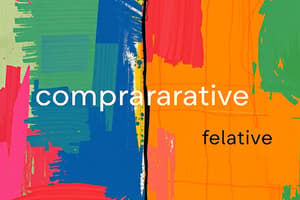Podcast
Questions and Answers
Which of the following adjectives can form a comparative using 'er'?
Which of the following adjectives can form a comparative using 'er'?
- interesting
- large (correct)
- happy
- beautiful
What is the correct superlative form of 'good'?
What is the correct superlative form of 'good'?
- goodest
- best (correct)
- bettered
- better
Which of these adjectives correctly uses 'most' for its superlative form?
Which of these adjectives correctly uses 'most' for its superlative form?
- interesting
- most interesting (correct)
- least
- more beautiful
What is the superlative form of 'easy'?
What is the superlative form of 'easy'?
Which statement demonstrates the proper use of 'than' with a comparative?
Which statement demonstrates the proper use of 'than' with a comparative?
Which of the following sentences uses a comparative adjective correctly?
Which of the following sentences uses a comparative adjective correctly?
Which of these adjectives does not follow standard rules for forming comparatives?
Which of these adjectives does not follow standard rules for forming comparatives?
What distinguishes a superlative adjective?
What distinguishes a superlative adjective?
Which sentence illustrates the order of comparison correctly?
Which sentence illustrates the order of comparison correctly?
Which of the following adjectives changes '-y' to '-ier' when forming a comparative?
Which of the following adjectives changes '-y' to '-ier' when forming a comparative?
Flashcards
Comparatives
Comparatives
Words used to compare two things, formed with "er" or "more" (e.g., smaller, more beautiful).
Superlatives
Superlatives
Words used to compare three or more things, formed with "est" or "most" (e.g., smallest, most beautiful).
Forming Comparatives with "er"
Forming Comparatives with "er"
For adjectives with one syllable, add "-er" (e.g., big - bigger). For two-syllable adjectives ending in "-y", change "-y" to "-ier" (e.g., happy - happier).
Forming Comparatives with "more"
Forming Comparatives with "more"
Signup and view all the flashcards
Forming Superlatives with "est"
Forming Superlatives with "est"
Signup and view all the flashcards
Forming Superlatives with "most"
Forming Superlatives with "most"
Signup and view all the flashcards
Irregular Comparatives and Superlatives
Irregular Comparatives and Superlatives
Signup and view all the flashcards
Using "than" with Comparatives
Using "than" with Comparatives
Signup and view all the flashcards
Using "the" with Superlatives
Using "the" with Superlatives
Signup and view all the flashcards
Different Meanings of Comparatives
Different Meanings of Comparatives
Signup and view all the flashcards
Study Notes
Comparatives
- Comparatives are used to compare two things.
- They are formed with "er" or "more"
- Example: smaller, more beautiful
Superlatives
- Superlatives are used to compare three or more things.
- They are formed with "est" or "most"
- Example: smallest, most beautiful
Forming Comparatives with "er"
- Add "-er" to the end of one-syllable adjectives:
- big – bigger
- small – smaller
- For two-syllable adjectives ending in -y, change the "-y" to "-ier":
- happy – happier
- easy – easier
- For two or more syllable adjectives, use "more":
- beautiful – more beautiful
- interesting – more interesting
Forming Superlatives with "est"
- Add "-est" to the end of one-syllable adjectives:
- big – biggest
- small – smallest
- For two-syllable adjectives ending in -y, change the "-y" to "-iest":
- happy – happiest
- easy – easiest
- For two or more syllable adjectives, use "most":
- beautiful – most beautiful
- interesting – most interesting
Irregular Comparatives and Superlatives
- Some adjectives have irregular forms for comparatives and superlatives.
- Examples:
- good – better – best
- bad – worse – worst
- far – farther/further – farthest/furthest
- many/much – more – most
- little – less – least
Using "than" with Comparatives
- The word "than" is used to introduce the second item in a comparison.
- Example:
- This car is faster than that car.
Using "the" with Superlatives
- Superlative adjectives are always preceded by "the".
- Example:
- The tallest mountain in the world is Mount Everest.
Different Meanings of Comparatives
- Comparatives don't always refer to a comparison of two items.
- They can also suggest a difference in degree between something and itself.
- Example:
- The book is getting more interesting. (The interest is increasing.)
- Example:
- They can also suggest a difference in degree between something and itself.
Order of Comparison
- To construct grammatically correct and clear comparisons, place the comparative or superlative adjective after the comparative or superlative adjective to create a double comparative structure.
- Example:
- The bigger the better.
- The quicker the better.
- Example:
Studying That Suits You
Use AI to generate personalized quizzes and flashcards to suit your learning preferences.




